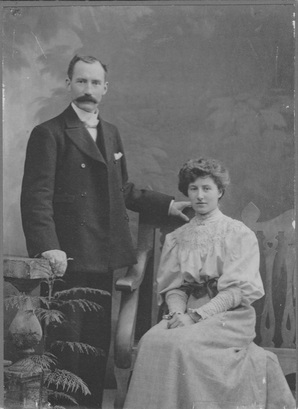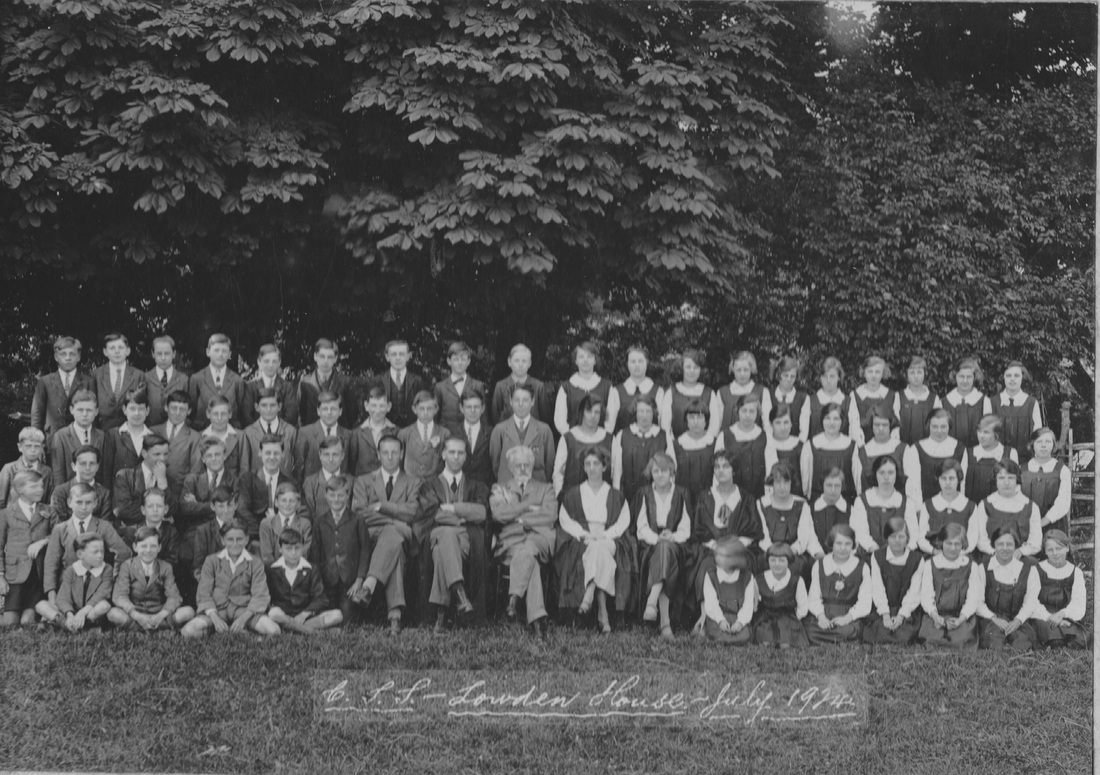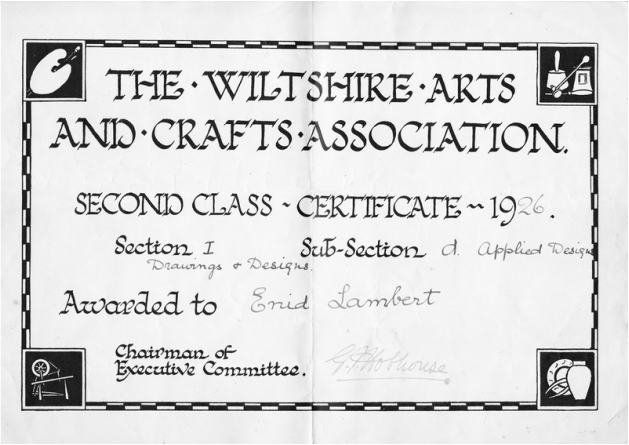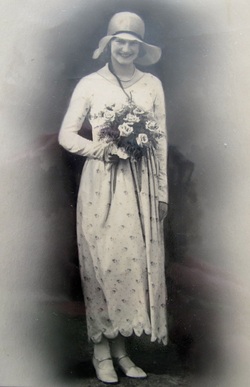
Childhood in Central Box
Reminiscences of Enid Margaret Daymond, nee Lambert (1911 - 1999)
Written about 1980 for her grandchildren
Enid Daymond left the area when she married, aged 21, but she never forgot her childhood in the village and recorded it in detail for the enjoyment of her children and the rest of the Lambert clan.
We are grateful to her family for permission to reproduce it here.
Left: Enid Margaret Lambert in about 1925 as a bridesmaid at the wedding of her half-brother Francis.
Photos courtesy of Mark Daymond and Margaret Wakefield
Reminiscences of Enid Margaret Daymond, nee Lambert (1911 - 1999)
Written about 1980 for her grandchildren
Enid Daymond left the area when she married, aged 21, but she never forgot her childhood in the village and recorded it in detail for the enjoyment of her children and the rest of the Lambert clan.
We are grateful to her family for permission to reproduce it here.
Left: Enid Margaret Lambert in about 1925 as a bridesmaid at the wedding of her half-brother Francis.
Photos courtesy of Mark Daymond and Margaret Wakefield
I
was born in Box, a village on the south edge of Wiltshire which borders with Somerset. The city of Bath, in Somerset then, is
only six miles away and it used to intrigue us when children to stand with one
foot in Wiltshire and one in Somerset.
Within a few paces of my home there stood a milestone marked London - 100 miles. This also interested me
when I was very young conjuring up pictures of Dick Whittington and a great
city.
Box in those days was a quiet little village known for its stone quarries and the famous Box tunnel; a three mile long railway tunnel built by Brunel on the main GWR line linking London with the West Country. It begins in Box and ends at the small country town of Corsham. The village nestles amidst woods, downs and fields and a brook, known as Box Brook, runs through low-lying meadows with a mill beside it. It was quite a large mill which supplied flour for miles around (and incidentally for your great grandfather's bakery). My uncle owned the mill and beautiful mill house in those days and the garden with its long path, flagged with huge round mill-stones and the surrounding meadows and brook were favourite places to play with friends and cousins.
Box in those days was a quiet little village known for its stone quarries and the famous Box tunnel; a three mile long railway tunnel built by Brunel on the main GWR line linking London with the West Country. It begins in Box and ends at the small country town of Corsham. The village nestles amidst woods, downs and fields and a brook, known as Box Brook, runs through low-lying meadows with a mill beside it. It was quite a large mill which supplied flour for miles around (and incidentally for your great grandfather's bakery). My uncle owned the mill and beautiful mill house in those days and the garden with its long path, flagged with huge round mill-stones and the surrounding meadows and brook were favourite places to play with friends and cousins.
|
The Family
I was one of nine children. I had two sisters and one brother and four step-brothers and one step-sister. My step-sisters and brothers were practically grown up when my father's first wife died and he married my mother, who was many years younger than he. What an undertaking - to start off married life with a ready-made family of five! But she proved more than equal to it and we grew up a loving and united family. Actually, Francis, the youngest, was brought up by my father's two unmarried sisters, but in the same village. And the next boy, Edward, died when he was 19, so I don't remember him. The eldest, Herbert, was then at university, at St John's College, Oxford. The next, Cecil, went into my father's firm and learned to be a very fine draughtsman. Florence Lucy was at Teacher Training College and the younger ones were still at school. In the second family came Kathleen, Philip, me and Betty with gaps of two, three and five years between us. |
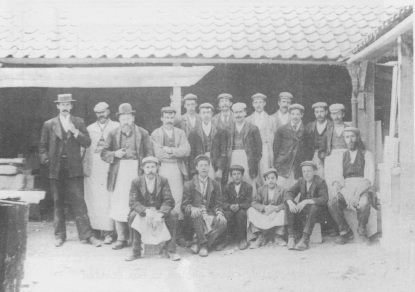 Lambert's stone yard at Box Station
Lambert's stone yard at Box Station
My father's firm was a subsidiary of the Bath and Portland Stone Firms and was based in Box, where the famous Bath stone (or Box Ground Stone) was quarried. The huge blocks of quarried stone were taken direct by railway truck to his yard which was situated beside the railway, a mile out of the village, near the railway station.
There he employed sawyers and masons and carvers and carried out specialist work for civic buildings, churches etc. Some of his work is in Winchester Cathedral, the beautiful carved stone screen there. When I was very small it was a great treat to go there with my cousins to watch my father doing beautiful, intricate drawings on a huge drawing board, sometimes to be given a lump of stone and a chisel to make a headstone for a pet's grave.
There he employed sawyers and masons and carvers and carried out specialist work for civic buildings, churches etc. Some of his work is in Winchester Cathedral, the beautiful carved stone screen there. When I was very small it was a great treat to go there with my cousins to watch my father doing beautiful, intricate drawings on a huge drawing board, sometimes to be given a lump of stone and a chisel to make a headstone for a pet's grave.
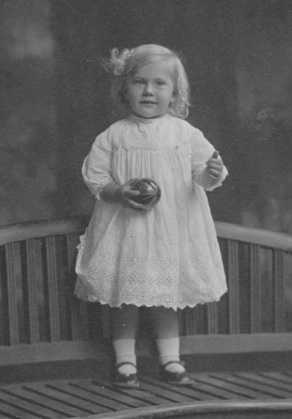 Enid aged 3 years in 1915
Enid aged 3 years in 1915
Upbringing
I was brought up and lived in the same house in Box (2 Kingston Villas) until I married and I have the happiest memories of a disciplined and loving home life. Meals were always at regular times and a custom that continued even when we were grown-up was that the boys always sat on one side of the table and the girls on the other.
My mother was very firm and no meant no. My father would never go against her decisions but I could sometimes wheedle him into things; he was very soft-hearted with children. I don't think it ever occurred to me to be anything but obedient and polite to parents and elders - except that I wouldn't eat my greens - and the only punishment at all that I remember is being sent to my room because of this.
We went to Sunday School and church on Sundays and in the summer I remember lovely long walks with my parents. There were usually visitors for tea, which was special on that day, with fancy cakes and Bath buns instead of the usual home-made and in summer watercress sandwiches. I remember this because it was my job on Saturdays to walk two miles to fetch the watercress, three pennyworth each for my mother and grandmother.
I was brought up and lived in the same house in Box (2 Kingston Villas) until I married and I have the happiest memories of a disciplined and loving home life. Meals were always at regular times and a custom that continued even when we were grown-up was that the boys always sat on one side of the table and the girls on the other.
My mother was very firm and no meant no. My father would never go against her decisions but I could sometimes wheedle him into things; he was very soft-hearted with children. I don't think it ever occurred to me to be anything but obedient and polite to parents and elders - except that I wouldn't eat my greens - and the only punishment at all that I remember is being sent to my room because of this.
We went to Sunday School and church on Sundays and in the summer I remember lovely long walks with my parents. There were usually visitors for tea, which was special on that day, with fancy cakes and Bath buns instead of the usual home-made and in summer watercress sandwiches. I remember this because it was my job on Saturdays to walk two miles to fetch the watercress, three pennyworth each for my mother and grandmother.
When we were all young my mother had a maid called Gladys (later we had Maud) and an odd job boy who came in time to clean all the boots and shoes before breakfast and to sweep the path and yard and any other odd jobs before going on to work for my father. Knives were not stainless in those days and had to be cleaned every day on a board with special knife polish. All this was done in an out-house. A washerwoman called Mrs Bolwell came on Mondays to do the large amount of washing in the scullery where a fire was lit under a huge copper of boiling water. Bed linen and towels were always given a boil after being washed and were always as white as snow. This old woman (she seemed old to me) wore a man's cap and a huge apron and boots. She was haunted by the thought of dying and her one wish was to die in her sleep when her time came.. and she did! What strange things one remembers!
Quite a number of relations lived in the village including my mother's parents, so there were lots of uncles, aunts and cousins besides the grandparents to visit and be visited by and to help in times of illness.
Quite a number of relations lived in the village including my mother's parents, so there were lots of uncles, aunts and cousins besides the grandparents to visit and be visited by and to help in times of illness.
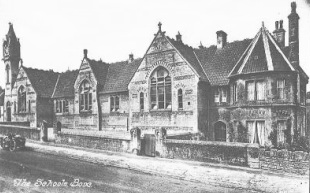 Box School in 1920 courtesy Box Parish Council
Box School in 1920 courtesy Box Parish Council
First School
I was born in 1911 and started school in 1916 when I was five. I went to the village school to begin with and remember being taken by my father. After that I hid in the bushes in the garden instead of going to school, only appearing to my mother in the house when it was too late to go.
By this time my sister was at another school so friends older than me were asked to take me. After that all was well and I settled down. My father was one of the school governors and sometimes came in to look round.
The infant school mistress was a tiny little woman not much taller than the children, called Miss Smith. We used slates and slate pencils at first for writing and frames with beads for counting. There was an indoor swing with a seat like an armchair; on rare occasions we were given a swing as a very big treat. Later, in the higher classes, we had Reading, English, Arithmetic, Nature Study, Scripture, Singing, Needlework, Drawing, Geography, History and Drill. We often went for Nature Walks and acted plays.
Punishments were standing out in front of the class or a slap on the hand with a ruler.
I was born in 1911 and started school in 1916 when I was five. I went to the village school to begin with and remember being taken by my father. After that I hid in the bushes in the garden instead of going to school, only appearing to my mother in the house when it was too late to go.
By this time my sister was at another school so friends older than me were asked to take me. After that all was well and I settled down. My father was one of the school governors and sometimes came in to look round.
The infant school mistress was a tiny little woman not much taller than the children, called Miss Smith. We used slates and slate pencils at first for writing and frames with beads for counting. There was an indoor swing with a seat like an armchair; on rare occasions we were given a swing as a very big treat. Later, in the higher classes, we had Reading, English, Arithmetic, Nature Study, Scripture, Singing, Needlework, Drawing, Geography, History and Drill. We often went for Nature Walks and acted plays.
Punishments were standing out in front of the class or a slap on the hand with a ruler.
Second School
I started my secondary education when I was eleven at a fee-paying school in the town of Chippenham and travelled there daily by train, walking a mile to the station. There were three different ways to the station, so one could vary the walk but best of all was by the church, across the brook and two fields. We seemed to be always running and arriving at the last minute but an understanding Guard would always hold up the train. My sister was already high up in the school and working towards Matriculation and several friends in the village went to the same school. Lessons were: English, Latin, French, Maths, Algebra, Geometry, Botany, Chemistry, Art, Divinity, Singing and PE (Physical Education). We played tennis, netball and hockey and did country dancing and sword dancing.
School dress was navy blue serge gym tunics with white blouses and school tie of green and gold, green blazer, navy coat, black shoes and stockings. In winter, black velour hat with green and gold ribbon and badge. In summer we wore straw hats with the same hatbands. The only punishment I can remember was detention - ie staying after school hours and writing out lines. One was being sent to the headmistress for something very bad.
Our House
My father had the house built in which we lived at 2 Kingston Villas; all materials used were of the best. It was built of Bath stone and he hand-picked every piece of stone in it. There were four bedrooms, bathroom and lavatory upstairs and a huge built-in cupboard on the landing. A loft above to store things in, including the apples for winter use. A drawing room, dining room, kitchen, pantry, scullery downstairs.
I started my secondary education when I was eleven at a fee-paying school in the town of Chippenham and travelled there daily by train, walking a mile to the station. There were three different ways to the station, so one could vary the walk but best of all was by the church, across the brook and two fields. We seemed to be always running and arriving at the last minute but an understanding Guard would always hold up the train. My sister was already high up in the school and working towards Matriculation and several friends in the village went to the same school. Lessons were: English, Latin, French, Maths, Algebra, Geometry, Botany, Chemistry, Art, Divinity, Singing and PE (Physical Education). We played tennis, netball and hockey and did country dancing and sword dancing.
School dress was navy blue serge gym tunics with white blouses and school tie of green and gold, green blazer, navy coat, black shoes and stockings. In winter, black velour hat with green and gold ribbon and badge. In summer we wore straw hats with the same hatbands. The only punishment I can remember was detention - ie staying after school hours and writing out lines. One was being sent to the headmistress for something very bad.
Our House
My father had the house built in which we lived at 2 Kingston Villas; all materials used were of the best. It was built of Bath stone and he hand-picked every piece of stone in it. There were four bedrooms, bathroom and lavatory upstairs and a huge built-in cupboard on the landing. A loft above to store things in, including the apples for winter use. A drawing room, dining room, kitchen, pantry, scullery downstairs.
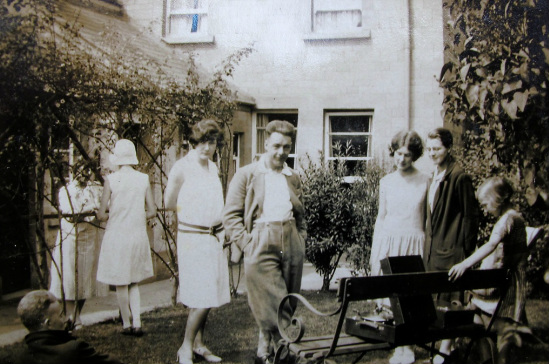 L to R: Mrs BA Lambert, ?, Kathleen, ?, Enid, ?, Betty; front left Cyril Daymond, at Kingston Villa in 1928
L to R: Mrs BA Lambert, ?, Kathleen, ?, Enid, ?, Betty; front left Cyril Daymond, at Kingston Villa in 1928
We had a large walled-in garden with lawns back and front, a great variety of flowering shrubs, trees and flowers and every kind of vegetable, also apples, pears and soft fruits. Vegetables were seldom if ever bought. Enough were grown, even potatoes, to last the year round.
At the end of the garden there was a summer-house; it was quite unique, I have never seen another like it. I think my father had it specially made. It was well built above ground-level of wood (cedar wood it must have been) with a sloping (from a centre point) thatched roof. Inside, the walls were polished wood and around three walls were fitted, slatted wooden seats; very comfortable, with the door on the fourth side.
A wooden table slotted into the floor in the middle and, best of all, there were two little casement windows of brilliant red and blue stained glass; they were just big enough for a small child to squeeze through on to the adjoining wall. This wall which surrounded the garden was of different heights and we loved walking all along the top, daring each other to jump from the very high places. As you can imagine, the summer-house was a meeting place for a whole gang of friends and from there we played, either in the garden, or in the paddock (now the house Moonrakers) and fields beyond (now Bargates), and slept sometimes in the summer.
Beyond the garden we had a small paddock partly planted with fruit trees and bounded on the far side by a thorn hedge and trees. Beyond that again, there was a very large field. In our own special part of the paddock we had a see-saw and two favourite trees for climbing, one much more difficult than the other. The easy one was a big hollow ash tree. The trunk was hollow, then it branched off in two parts, where four or five of us could sit comfortably facing each other. We used to sit in it playing games and telling stories. My older sister had a friend called Althea, who told us wonderful creepy ghost stories. I was half frightened but fascinated.
Foods
As I have said, all vegetables and much fruit was grown in the garden, so everything was fresh and home grown. When eggs were plentiful (we kept hens) my mother preserved some in something called waterglass in large earthenware crocks. My father used to say that he would rather pay food bills than doctor's bills. Our food was plentiful and good but never wasted. Mother always kept a stock pot going and there were always large basins of stock jelly for making gravy and soups. Also of pure beef dripping, which was delicious on toast by the fire on cold winter evenings.
There were no fridges in those days, but the pantry with its marble slabs and gauze covered windows was always cool. On Sundays, always a joint, usually sirloin of beef, Yorkshire pudding with vegetables fresh from the garden. The beef was hung in the oven so that some of the juices dropped onto the Yorkshire pudding making it deliciously gooey and tasty in the middle. I think my mother cooked the best Sunday dinners I have ever tasted. Puddings were always plain: fruit tarts, milk puddings, suet, apple or treacle puddings, stewed fruit and blancmanges. Jellies and trifles were only had on birthdays and at Christmas. An ice cream cornet was a very occasional treat in the summer. Milk was delivered twice a day and bread once.
At the end of the garden there was a summer-house; it was quite unique, I have never seen another like it. I think my father had it specially made. It was well built above ground-level of wood (cedar wood it must have been) with a sloping (from a centre point) thatched roof. Inside, the walls were polished wood and around three walls were fitted, slatted wooden seats; very comfortable, with the door on the fourth side.
A wooden table slotted into the floor in the middle and, best of all, there were two little casement windows of brilliant red and blue stained glass; they were just big enough for a small child to squeeze through on to the adjoining wall. This wall which surrounded the garden was of different heights and we loved walking all along the top, daring each other to jump from the very high places. As you can imagine, the summer-house was a meeting place for a whole gang of friends and from there we played, either in the garden, or in the paddock (now the house Moonrakers) and fields beyond (now Bargates), and slept sometimes in the summer.
Beyond the garden we had a small paddock partly planted with fruit trees and bounded on the far side by a thorn hedge and trees. Beyond that again, there was a very large field. In our own special part of the paddock we had a see-saw and two favourite trees for climbing, one much more difficult than the other. The easy one was a big hollow ash tree. The trunk was hollow, then it branched off in two parts, where four or five of us could sit comfortably facing each other. We used to sit in it playing games and telling stories. My older sister had a friend called Althea, who told us wonderful creepy ghost stories. I was half frightened but fascinated.
Foods
As I have said, all vegetables and much fruit was grown in the garden, so everything was fresh and home grown. When eggs were plentiful (we kept hens) my mother preserved some in something called waterglass in large earthenware crocks. My father used to say that he would rather pay food bills than doctor's bills. Our food was plentiful and good but never wasted. Mother always kept a stock pot going and there were always large basins of stock jelly for making gravy and soups. Also of pure beef dripping, which was delicious on toast by the fire on cold winter evenings.
There were no fridges in those days, but the pantry with its marble slabs and gauze covered windows was always cool. On Sundays, always a joint, usually sirloin of beef, Yorkshire pudding with vegetables fresh from the garden. The beef was hung in the oven so that some of the juices dropped onto the Yorkshire pudding making it deliciously gooey and tasty in the middle. I think my mother cooked the best Sunday dinners I have ever tasted. Puddings were always plain: fruit tarts, milk puddings, suet, apple or treacle puddings, stewed fruit and blancmanges. Jellies and trifles were only had on birthdays and at Christmas. An ice cream cornet was a very occasional treat in the summer. Milk was delivered twice a day and bread once.
|
An old man known as Dirty Dick came round the village once a week with a horse and cart, selling fish and our main groceries were delivered from Bath, a man calling first to take the order each week. Oranges and bananas were quite a luxury, so were sweets and chocolates. My father would buy either fruit drops or Neapolitan chocolates on Saturdays and we were given one or two on Saturday evenings.
|
Fish Seller Called Dirty Dick |
As soon as I was old enough I did my grandmother's shopping on Saturday mornings for which I received threepence. I spent this immediately on penny bars of Sharp's Creamy Toffee and liquorice boot laces because they lasted and with a little friend who had the same amount to spend ate it all in the afternoon, a real orgy!
My grandmother's shopping was quite an adventure and took all the morning. It was quite a long way to her house, which stood on the outskirts of the village, and from there to the shops and back. Then another long walk up a steep lane beside her house which led to the downs and golf course, this time to fetch watercress from a place on the way called Washwells, and the farmhouse butter from the farm at the top of the lane. I loved that lane, which was like the lanes in Cornwall, with high steep banks on each side. I walked up it and ran down it, but always lingered to pick flowers and grasses.
Whenever I smell the musky scent of the wild Herb Robert or see shaking grasses or Wigwams as we used to call them I am reminded of it and my grandparents. I mustn't forget that one shop in the village sold Daymond's famous cakes and we particularly liked their delicious Chelsea buns, which I remember being sent to buy!
My grandmother's shopping was quite an adventure and took all the morning. It was quite a long way to her house, which stood on the outskirts of the village, and from there to the shops and back. Then another long walk up a steep lane beside her house which led to the downs and golf course, this time to fetch watercress from a place on the way called Washwells, and the farmhouse butter from the farm at the top of the lane. I loved that lane, which was like the lanes in Cornwall, with high steep banks on each side. I walked up it and ran down it, but always lingered to pick flowers and grasses.
Whenever I smell the musky scent of the wild Herb Robert or see shaking grasses or Wigwams as we used to call them I am reminded of it and my grandparents. I mustn't forget that one shop in the village sold Daymond's famous cakes and we particularly liked their delicious Chelsea buns, which I remember being sent to buy!
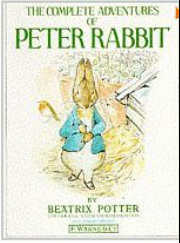
Pastimes
You might ask what hobbies I had and what games I played. More than anything I liked reading and from the time I could read to myself, beginning with Peter Rabbit and Squirrel Nutkin, I was happy when immersed in books. I loved fairy stories and beside all the well known ones such as Snow White, Rose Red and Jack and the Beanstalk, I read Grimm's and Hans Anderson's fairy stories over and over.
I read Robinson Crusoe and Swiss Family Robinson and there were many old fashioned Victorian books in the house over which I cried; the only titles which I remember were A Peep Behind the Scenes and Eric, or Little by Little.
There was a really splendid lending library in the village run by two maiden ladies, voluntarily. To borrow a book for a week cost only one halfpenny. At the age of about nine I discovered Anne of Green Gables books by LM Montgomery, these were my favourites. The Little Women books by Louise Alcott, The Girl of the Limberlost and Freckles by Gene Stratton Porter, Daddy Long Legs and Dear Enemy by Jean Webster, all the school books by Angela Brazil, Paddy the Next Best Thing and many others.
You might ask what hobbies I had and what games I played. More than anything I liked reading and from the time I could read to myself, beginning with Peter Rabbit and Squirrel Nutkin, I was happy when immersed in books. I loved fairy stories and beside all the well known ones such as Snow White, Rose Red and Jack and the Beanstalk, I read Grimm's and Hans Anderson's fairy stories over and over.
I read Robinson Crusoe and Swiss Family Robinson and there were many old fashioned Victorian books in the house over which I cried; the only titles which I remember were A Peep Behind the Scenes and Eric, or Little by Little.
There was a really splendid lending library in the village run by two maiden ladies, voluntarily. To borrow a book for a week cost only one halfpenny. At the age of about nine I discovered Anne of Green Gables books by LM Montgomery, these were my favourites. The Little Women books by Louise Alcott, The Girl of the Limberlost and Freckles by Gene Stratton Porter, Daddy Long Legs and Dear Enemy by Jean Webster, all the school books by Angela Brazil, Paddy the Next Best Thing and many others.
|
I had Rainbow comics when very young and Children's Newspapers. Later each week, School Friend or Schoolgirl's Own. I still remember the names of the characters which included Bessie Bunter, the fat girl. Later there were books of Sapper and Bulldog Drummond, all the books of Dornford Yates and so on.
|
Splendid Lending Library at |
I had piano lessons from a Mr Harold Hodges, who came out from Bath and spent a lot of time playing duets with me as a friend. We even played at village concerts once or twice. My step-brother had a gramophone and bought a wide assortment of records from the latest dance bands to Gilbert & Sullivan to best classics and singers.
I always adored flowers, going for walks and making collections of every sort. I knew where to find special plants, such as bee-orchids, fly-orchids, heartsease, spindle-berries and chicory. Since we were lucky enough to have downlands, woods, low lying marshy meadows by the brook and harvest fields, one could find a great variety of flowers known to each habitat.
I had no pets of my own but had some silk worms once and I liked caterpillars. My elder sister had a cat called Casablanca and my younger sister a rabbit. My friends had guinea pigs.
Playing
We played the usual ball and skipping games, and Five-stones which we called Dibs. In winter we had large wooden hoops, my brother had an iron one. Whips, spinning tops and marbles had their turn. Grandmother's Footsteps, Here We Go Looby Loo and Briar Rosebud were played at school. I think a game One, Two , Three, Sixty must have been an invention. With a crowd of friends we played this in the field adjoining our paddock. One person closed his eyes and counted up to sixty by a chosen tree, whilst the others hid in all directions (there were hedges and trees). When sixty was up, we had to get back to the tree without being caught by the person who counted and shout One, Two, Three, Sixty.
I always adored flowers, going for walks and making collections of every sort. I knew where to find special plants, such as bee-orchids, fly-orchids, heartsease, spindle-berries and chicory. Since we were lucky enough to have downlands, woods, low lying marshy meadows by the brook and harvest fields, one could find a great variety of flowers known to each habitat.
I had no pets of my own but had some silk worms once and I liked caterpillars. My elder sister had a cat called Casablanca and my younger sister a rabbit. My friends had guinea pigs.
Playing
We played the usual ball and skipping games, and Five-stones which we called Dibs. In winter we had large wooden hoops, my brother had an iron one. Whips, spinning tops and marbles had their turn. Grandmother's Footsteps, Here We Go Looby Loo and Briar Rosebud were played at school. I think a game One, Two , Three, Sixty must have been an invention. With a crowd of friends we played this in the field adjoining our paddock. One person closed his eyes and counted up to sixty by a chosen tree, whilst the others hid in all directions (there were hedges and trees). When sixty was up, we had to get back to the tree without being caught by the person who counted and shout One, Two, Three, Sixty.
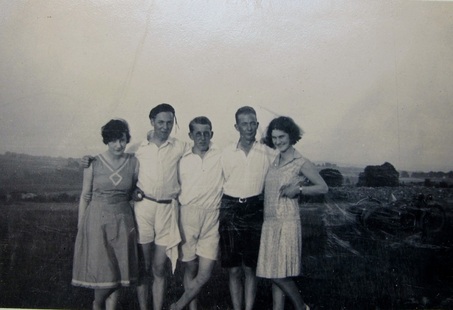 L to R: Kathleen, Ken Farley, Phil, Cyril Daymond and Enid
L to R: Kathleen, Ken Farley, Phil, Cyril Daymond and Enid
We played cricket, boys and girls together, from the time we were very young onwards, on the lawn, in the fields, anywhere we could make a pitch. For as long as I can remember, cricket seemed to be a part of our lives, my father, mother and friends being so addicted to it.
The book A Century of Village Cricket was written by Don Bradfield. He was one who used to play with us, living in the next house; he and my brother Philip were life-long friends. You will see that the Lamberts have been connected with the club almost from its inception. Although my father didn't play, he was always an active member of the committee and I used to go with him to watch matches on Saturday afternoons in the summer. Later I played tennis, hockey and netball.
The book A Century of Village Cricket was written by Don Bradfield. He was one who used to play with us, living in the next house; he and my brother Philip were life-long friends. You will see that the Lamberts have been connected with the club almost from its inception. Although my father didn't play, he was always an active member of the committee and I used to go with him to watch matches on Saturday afternoons in the summer. Later I played tennis, hockey and netball.
Other friends of my sister Kathleen and my age, named Margaret and Ethel, lived at the top of a steep hill called Quarry Hill; their garden ran a long way down it. From their house it was not far to some beech woods, where there were entrances to disused quarries. We would explore into them as far as we dared, feeling the air growing older and colder, and always glad to be out in the sun again.
In autumn we scuffed through the fallen beech leaves which were almost up to our knees. In their garden they had some proper parallel bars on which we did all sorts of stunts and exercises.
Another family of friends (two girls and one boy), Una, Jo and David had a donkey and an old covered wagon in which we all played. Their father had an inn and a factory for making mineral waters. The bottles had glass marbles in their necks which acted as stoppers and we used to smash them to get out the marbles. David used to terrify us because he was so daring at climbing trees and walking across a terribly narrow ledge of a bridge high over the railway line. Later he went into the Navy, which seemed rather suitable.
We all learnt to swim in Box Brook, taught by our village doctor. Or rather, I didn't learn to swim because of an accident during my first lesson. We wore a sort of canvas harness, which was attached to a pole, in which the doctor held us up where the water was deepest and, at the very first jump, the rope attaching me to the pole broke and I went in and under. I would never do it again but I bathed and floated on my back.
It was a beautiful winding brook, deep in some places, shallow in others, and crystal clear where it broadened out and where our favourite paddling places were. Sometimes we walked for miles following the brook through meadows to a place called Weavern where we could hire an old tub of a rowing boat.
My father bought another house, larger than ours and opposite, called Lorne House. For a time it was empty whilst it was being decided whether to move there or not, and it was great fun playing all over the empty, echoing house and garden. In the end, my mother decided to stay where we were. Though it was a lovely house, the garden was much smaller and the kitchen quarters were in a basement. (Incidentally, it was later bought by the Reverend Vere Awdrey whose son (Wilbert Vere Awdry) wrote Thomas, the Tank Engine books).
In autumn we scuffed through the fallen beech leaves which were almost up to our knees. In their garden they had some proper parallel bars on which we did all sorts of stunts and exercises.
Another family of friends (two girls and one boy), Una, Jo and David had a donkey and an old covered wagon in which we all played. Their father had an inn and a factory for making mineral waters. The bottles had glass marbles in their necks which acted as stoppers and we used to smash them to get out the marbles. David used to terrify us because he was so daring at climbing trees and walking across a terribly narrow ledge of a bridge high over the railway line. Later he went into the Navy, which seemed rather suitable.
We all learnt to swim in Box Brook, taught by our village doctor. Or rather, I didn't learn to swim because of an accident during my first lesson. We wore a sort of canvas harness, which was attached to a pole, in which the doctor held us up where the water was deepest and, at the very first jump, the rope attaching me to the pole broke and I went in and under. I would never do it again but I bathed and floated on my back.
It was a beautiful winding brook, deep in some places, shallow in others, and crystal clear where it broadened out and where our favourite paddling places were. Sometimes we walked for miles following the brook through meadows to a place called Weavern where we could hire an old tub of a rowing boat.
My father bought another house, larger than ours and opposite, called Lorne House. For a time it was empty whilst it was being decided whether to move there or not, and it was great fun playing all over the empty, echoing house and garden. In the end, my mother decided to stay where we were. Though it was a lovely house, the garden was much smaller and the kitchen quarters were in a basement. (Incidentally, it was later bought by the Reverend Vere Awdrey whose son (Wilbert Vere Awdry) wrote Thomas, the Tank Engine books).
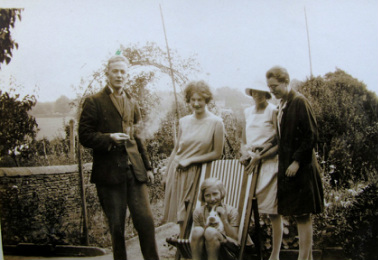 L to R: Cyril, Enid, Betty, ?, ? August Bank Holiday, 1928
L to R: Cyril, Enid, Betty, ?, ? August Bank Holiday, 1928
Clothes
We always had special clothes for Sundays. In summer I remember white embroidered muslin frocks with a sash of palest blue satin ribbon threaded through the waist and a straw hat with a wreath of daisies and buttercups (artificial). For weekdays we wore very simple cotton frocks and white linen hats.
In winter I wore knitted jerseys with a woollen cap with a bobble on the top to match (made by someone we knew) and pleated kilts. Always a best Sunday coat with velour hat to match.
I remember a particularly attractive coat and hat passed down to me from my sister, Kathleen, though I am sure it suited her far better than it did me, because she had long brown hair and hazel eyes whereas I had fair hair and blue eyes and my mother usually chose blue for me. The coat was a most beautiful spindle-berry pink knobbly tweed, trimmed with astrakhan round the hem and collar; the hat was black furry velour with large upturned brim and trimmed with a garland of red and pink berries. I think that my sister first wore these at the wedding of our step-sister, which I remember only very vaguely. I remember a fawn gabardine summer coat with raglan sleeves and a blue straw hat which I had when I went to stay with my married step-sister; also a lovely green velour cloth coat with velour hat to match at the time I went to stay with a school friend in the holidays. Alas! I had on a pair of new brown leather brogues which gave me blisters on both heels and spoilt the weekend. In my teens, best dresses were nearly always of tussore silk and made by a local dressmaker.
We always had special clothes for Sundays. In summer I remember white embroidered muslin frocks with a sash of palest blue satin ribbon threaded through the waist and a straw hat with a wreath of daisies and buttercups (artificial). For weekdays we wore very simple cotton frocks and white linen hats.
In winter I wore knitted jerseys with a woollen cap with a bobble on the top to match (made by someone we knew) and pleated kilts. Always a best Sunday coat with velour hat to match.
I remember a particularly attractive coat and hat passed down to me from my sister, Kathleen, though I am sure it suited her far better than it did me, because she had long brown hair and hazel eyes whereas I had fair hair and blue eyes and my mother usually chose blue for me. The coat was a most beautiful spindle-berry pink knobbly tweed, trimmed with astrakhan round the hem and collar; the hat was black furry velour with large upturned brim and trimmed with a garland of red and pink berries. I think that my sister first wore these at the wedding of our step-sister, which I remember only very vaguely. I remember a fawn gabardine summer coat with raglan sleeves and a blue straw hat which I had when I went to stay with my married step-sister; also a lovely green velour cloth coat with velour hat to match at the time I went to stay with a school friend in the holidays. Alas! I had on a pair of new brown leather brogues which gave me blisters on both heels and spoilt the weekend. In my teens, best dresses were nearly always of tussore silk and made by a local dressmaker.
Christmas
Christmas was a lovely time, preceded by much preparation. I remember helping to stone the raisins, blanch the almonds, and chop the peel which came in halves of crystallised oranges and lemons; gorgeous and sugary, for puddings and mincemeat and Christmas cake. Also I remember having a last stir and a wish when silver threepenny pieces were put into the puddings. And making marzipan potatoes and coconut ice. And paper chains with a fringed white ruffle for the huge ham. We walked miles for holly and dragged it home.
There was always a pre-Christmas trip to Bath to visit the toy-shops, particularly the one where there was a Fairy Grotto and Father Christmas. Part of the treat was a meal in the Swiss cafe. The crescent-shaped contingent with rolls, chocolate éclairs and cups of foaming hot chocolate are a delicious memory to this day! We were always nine or ten for Christmas dinner and more for tea and supper and the last preparation before my sister and her husband came to stay (as they always did) on Christmas Eve was the putting of two leaves into the dining room table to enlarge it.
We hung up our stockings which were always filled with an orange in the toe and nuts, an apple, sweets and pink and white sugar mice and little presents. Apart from that we just had one present from each of our parents, something we badly wanted, though not extravagant things. For years I wanted a scooter but never had one. My step-sister played the piano very well and her husband played the violin and we always had music and carol singing. After tea everyone played games and pulled crackers and roasted chestnuts and we were allowed to stay up late to a supper of ham, sherry trifles and mince pies, followed by Bath Oliver biscuits, cheese and celery.
Christmas was a lovely time, preceded by much preparation. I remember helping to stone the raisins, blanch the almonds, and chop the peel which came in halves of crystallised oranges and lemons; gorgeous and sugary, for puddings and mincemeat and Christmas cake. Also I remember having a last stir and a wish when silver threepenny pieces were put into the puddings. And making marzipan potatoes and coconut ice. And paper chains with a fringed white ruffle for the huge ham. We walked miles for holly and dragged it home.
There was always a pre-Christmas trip to Bath to visit the toy-shops, particularly the one where there was a Fairy Grotto and Father Christmas. Part of the treat was a meal in the Swiss cafe. The crescent-shaped contingent with rolls, chocolate éclairs and cups of foaming hot chocolate are a delicious memory to this day! We were always nine or ten for Christmas dinner and more for tea and supper and the last preparation before my sister and her husband came to stay (as they always did) on Christmas Eve was the putting of two leaves into the dining room table to enlarge it.
We hung up our stockings which were always filled with an orange in the toe and nuts, an apple, sweets and pink and white sugar mice and little presents. Apart from that we just had one present from each of our parents, something we badly wanted, though not extravagant things. For years I wanted a scooter but never had one. My step-sister played the piano very well and her husband played the violin and we always had music and carol singing. After tea everyone played games and pulled crackers and roasted chestnuts and we were allowed to stay up late to a supper of ham, sherry trifles and mince pies, followed by Bath Oliver biscuits, cheese and celery.
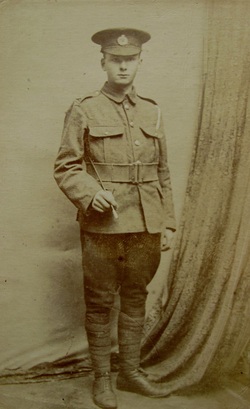
War
I was three years old when the 1914-18 war started. One of my earliest memories is being with my mother in the kitchen when she was making and baking a cake, mince pies and sausage rolls to send to Cecil, who was in the army in France, when he gave us a great surprise by walking in! He had been given unexpected leave.
Another day stands out, this time at the end of the war when my brother Herbert arrived home from India, where he was an officer in the army and stayed throughout the war. He brought many interesting objects made of ivory and brass and for me a lovely china doll.
My father's firm closed down completely during the war years, so times must have been difficult. He worked for a time in a bank in Bath. My mother was a wonderful manager and living in the country with our own hens and vegetables and fruits, we always had plenty to eat. I do just remember not liking the taste of margarine, there being no butter except sometimes from a farm.
Left: Cecil Lambert in uniform
I was three years old when the 1914-18 war started. One of my earliest memories is being with my mother in the kitchen when she was making and baking a cake, mince pies and sausage rolls to send to Cecil, who was in the army in France, when he gave us a great surprise by walking in! He had been given unexpected leave.
Another day stands out, this time at the end of the war when my brother Herbert arrived home from India, where he was an officer in the army and stayed throughout the war. He brought many interesting objects made of ivory and brass and for me a lovely china doll.
My father's firm closed down completely during the war years, so times must have been difficult. He worked for a time in a bank in Bath. My mother was a wonderful manager and living in the country with our own hens and vegetables and fruits, we always had plenty to eat. I do just remember not liking the taste of margarine, there being no butter except sometimes from a farm.
Left: Cecil Lambert in uniform
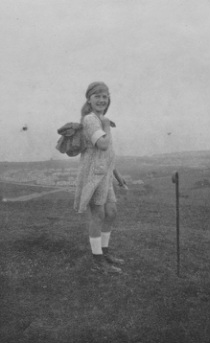 Enid in 1924 at Sugar Loaf Hill, Folkestone
Enid in 1924 at Sugar Loaf Hill, Folkestone
Holidays
We didn't all go away for family holidays but each one of us went to stay with relations from time to time. My first holiday away from home was with my mother when we went to stay with an aunt in Somerset. Apparently my poor mother had to cut short the holiday because I was such a misery away from the house.
From about the age of five my boy cousin of my age came from Folkestone each summer to stay with our grandparents and I would go and stay too, and that was the greatest fun. The house stood alone and it was called Thornwood and overlooked the beautiful Box Woods. We played in the garden where apple trees were always laden with apples and paddled in a stream in a field just over the wall.
Each summer we all went with friends and relations for picnics on the downs, called Kingsdown. Usually we walked up the steep lane (the same lane I walked up to fetch watercress), along the dusty winding road with wide grass verges where harebells and scabious grew, then the last clamber up to the downs to our favourite spot.
Sometimes the children piled into one of my uncle's huge corn wagons and were driven there by the two carthorses a longer way round to miss out the lane. We explored and played rounders and cricket, whilst the grown-ups unpacked, spread out the food and lemonade and brewed tea on my grandfather's Primus stove. These picnics were the highlight of our summers when we were all young together.
Besides the downs, the woods were a happy hunting ground during the holidays. They abounded in primroses, anemones and bluebells and were on great slopes so that climbing through them was always an adventure. The birdsong there was wonderful; as soon as one entered the woods one was aware of it. Near the entrance there was marshy ground where Kingcups, Ragged Robin and irises grew and one had to pick one's way through. Emerging from the woods there were steep grassy slopes where we slid from top to bottom sitting on old tin trays.
Sometimes, when I didn't mind leaving home, I was put on a train in Bath to visit my step-sister and her husband who lived on the Mendip Hills in Somerset. She knew children for me to play with and had masses of books for me to read. Best of all she let me ride her bicycle with the saddle lowered; it had a back pedal brake. When I was about 14 it was passed on to me, but until then I didn't have one. I also spent various holidays over the years with a favourite aunt and uncle at the seaside of Folkestone in Kent. This was quite a different world with bathing in the sea, picnics on the beach, walking up Sugar Loaf Hill, listening to military bands playing in the Leas Cliff Hall. My aunt had a very clever little dog. He hated being out in the rain and if she was in the town shopping and it began to rain, he would hop on to a bus and take himself home. He knew which bus to take and at which stop to get off near home! He became known to the conductor, of course!
We didn't all go away for family holidays but each one of us went to stay with relations from time to time. My first holiday away from home was with my mother when we went to stay with an aunt in Somerset. Apparently my poor mother had to cut short the holiday because I was such a misery away from the house.
From about the age of five my boy cousin of my age came from Folkestone each summer to stay with our grandparents and I would go and stay too, and that was the greatest fun. The house stood alone and it was called Thornwood and overlooked the beautiful Box Woods. We played in the garden where apple trees were always laden with apples and paddled in a stream in a field just over the wall.
Each summer we all went with friends and relations for picnics on the downs, called Kingsdown. Usually we walked up the steep lane (the same lane I walked up to fetch watercress), along the dusty winding road with wide grass verges where harebells and scabious grew, then the last clamber up to the downs to our favourite spot.
Sometimes the children piled into one of my uncle's huge corn wagons and were driven there by the two carthorses a longer way round to miss out the lane. We explored and played rounders and cricket, whilst the grown-ups unpacked, spread out the food and lemonade and brewed tea on my grandfather's Primus stove. These picnics were the highlight of our summers when we were all young together.
Besides the downs, the woods were a happy hunting ground during the holidays. They abounded in primroses, anemones and bluebells and were on great slopes so that climbing through them was always an adventure. The birdsong there was wonderful; as soon as one entered the woods one was aware of it. Near the entrance there was marshy ground where Kingcups, Ragged Robin and irises grew and one had to pick one's way through. Emerging from the woods there were steep grassy slopes where we slid from top to bottom sitting on old tin trays.
Sometimes, when I didn't mind leaving home, I was put on a train in Bath to visit my step-sister and her husband who lived on the Mendip Hills in Somerset. She knew children for me to play with and had masses of books for me to read. Best of all she let me ride her bicycle with the saddle lowered; it had a back pedal brake. When I was about 14 it was passed on to me, but until then I didn't have one. I also spent various holidays over the years with a favourite aunt and uncle at the seaside of Folkestone in Kent. This was quite a different world with bathing in the sea, picnics on the beach, walking up Sugar Loaf Hill, listening to military bands playing in the Leas Cliff Hall. My aunt had a very clever little dog. He hated being out in the rain and if she was in the town shopping and it began to rain, he would hop on to a bus and take himself home. He knew which bus to take and at which stop to get off near home! He became known to the conductor, of course!
|
Leaving School
I was not at all happy at my secondary school, chiefly because I worried dreadfully over lessons always. Having an older sister made me think that a great deal was expected of me which I couldn't live up to. Art was the only subject I really enjoyed, and got a prize for. So I begged my father to let me leave when I was 16, not being able to endure the thought of taking School Certificate Exams. He allowed me to, even though I had no idea what I wanted to do. |
For a while I stayed at home and helped my mother and ran the house whilst she went away for a holiday. By then two of my step-brothers were married and one lived at home, my sister was at Secretarial College, my brother just starting to work in my father's firm and my younger sister was following me at school.
Finally at the suggestion of an aunt who lived in Bath, I went there to learn hairdressing at its then most exclusive establishment. In those days a premium had to be paid (I think it was £20) then one was apprenticed for four years, during which time one earned the vast sum of five shillings and six pence a week for the first year; seven shillings and sixpence for the second year; ten shillings and six pence for the third year; and £1 a week for the fourth year.
No sooner had I finished my apprenticeship than I was married at 21.
Finally at the suggestion of an aunt who lived in Bath, I went there to learn hairdressing at its then most exclusive establishment. In those days a premium had to be paid (I think it was £20) then one was apprenticed for four years, during which time one earned the vast sum of five shillings and six pence a week for the first year; seven shillings and sixpence for the second year; ten shillings and six pence for the third year; and £1 a week for the fourth year.
No sooner had I finished my apprenticeship than I was married at 21.
Appendix
Lambert Family
Great Grandparents
George and Eliza Lambert
Grandparents
Henry Lambert and Jane Sarah Kingston
Children: Alfred K, Thomas Herbert, Mildred
Parents
Thomas Herbert Lambert (1860 - 1938) married
(a) Malinda Leonora White
(b) Beatrice Annie Richards in 1900
Children: (a) Herbert, Edward, Francis, Cecil, Florence Lucy
Children: (b) Kathleen, Philip, Enid Margaret (1911 - 1999) and Betty
Enid's Husband
Cyril Daymond
Richards Family
Grandparents
Charles Edwin Richards (1852 - 1940) and Emma Amelia (b 1856) who lived at Thornwood
Children: Beatrice Annie (Enid's mother), Fanny A, Amy Ellen, Edwin Charles (Ted), Lillian May, Francis Herbert (Frank)
Lambert Family
Great Grandparents
George and Eliza Lambert
Grandparents
Henry Lambert and Jane Sarah Kingston
Children: Alfred K, Thomas Herbert, Mildred
Parents
Thomas Herbert Lambert (1860 - 1938) married
(a) Malinda Leonora White
(b) Beatrice Annie Richards in 1900
Children: (a) Herbert, Edward, Francis, Cecil, Florence Lucy
Children: (b) Kathleen, Philip, Enid Margaret (1911 - 1999) and Betty
Enid's Husband
Cyril Daymond
Richards Family
Grandparents
Charles Edwin Richards (1852 - 1940) and Emma Amelia (b 1856) who lived at Thornwood
Children: Beatrice Annie (Enid's mother), Fanny A, Amy Ellen, Edwin Charles (Ted), Lillian May, Francis Herbert (Frank)
